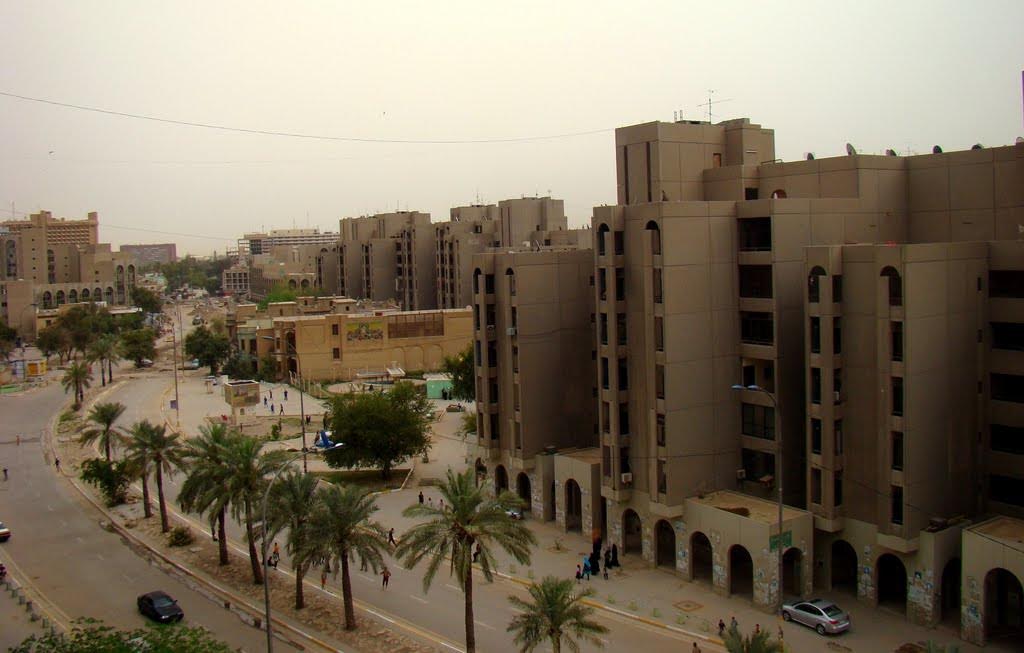In the summer of 1948, many Palestinian refugees moved to Baghdad, especially, from Ajzam, Jabaa and Ein Ghazal villages in the occupied city of Haifa. They left Palestine after a legendary resistance in the face of the Israeli occupation forces.
The Palestinians from these three villages constituted the majority of Palestinian refugees in Iraq. Additionally, tens of Palestinian families from Jaffa, Nablus, Jerusalem and Haifa settled down in Baghdad, Basra, Mosul and Fallujah whose people launched a campaign called "People of land, not guests" to accommodate the Palestinians entering Iraq through Jordan and Syria using wooden buses.
The estimated number of the Palestinians who arrived in Iraq was about five thousand; most of them were women and children. The Iraqi authorities moved some of them to other areas, and the Iraqi military took the responsibility of supporting them financially and helping with their accommodation using its own annual budget until the end of 1950. The Iraqi authorities then transferred the file of the Palestinian refugees from the Ministry of Defense to the Ministry of Social Affairs.
The successive Iraqi governments granted them the right to free education, health services and work in the country, and all other rights of Iraqi citizens, except owning properties and gaining Iraqi citizenship. They were also exempted from conscription into the armed forces.
The number of the Palestinians in Iraq increased to tens of thousands before the US-led invasion in 2003, but this number has declined significantly ever since being targeted in a campaign of arrests by US forces and armed militias, in addition to an assassination campaign which also targeted a number of prominent Palestinians in Iraq.
A few weeks following the invasion, the Palestinians became a target when US Marines attacked the Palestinian embassy in Baghdad, breaking doors and confiscating documents, in addition to arresting a number of the embassy staff, including a diplomat. That was followed by a bombing at a residential complex belonging to the Palestinians in Baghdad's al Baladiyat neighbourhood. At least 60 Palestinians were killed and wounded in that massacre, in addition to the destruction of a large number of properties.
The Iran-allied militias in Iraq, including Badr, Mahdi Army, Asaib Ahl al Haq and al Tha’ar, launched an assassination campaign which targeted many Palestinians in Iraq that were allegedly loyalists of the former state (before 2003).
During the climax of the sectarian war that followed, bombs struck two Shi'i holy shrines in Samarra, which left tens of thousands of Iraqis dead. The Palestinians found themselves trapped in a cycle of violence with nowhere to go, instead waiting for their deaths at the hands of the sectarian Iran-backed militias, the Iraqi forces, and even the US forces.
Some Iraqi NGOs have estimated the number of Palestinians killed in Iraq is amounts to 600, whilst 60 others are still missing. Some of the arrested Palestinians have appeared on TV channels belonging to Iraqi militias, admitting that they had committed terrorist crimes allegedly carried out in remote areas in Iraq, far from Palestinian residential areas. Clearly, these confessions were taken under torture.
As a result of these violations and crimes against them, a huge number of Palestinian refugees were forced to live in camps near the Iraqi border, such as al Ruweished and Trebil camps. Hundreds of Palestinian families lived in these desert camps for two and a half years because the Syrian authorities refused them entry in to Syria, and the government of former Prime Minister Nuri al Maliki refused to let them return to Iraq. This situation prompted the United Nations to step in and relocated them to other countries including Brazil, Chile, Italy, Sweden, Norway and Britain.
Abu Mohammed, a 60-year-old Palestinian refugee in Iraq, told Al Araby Al Jadeed: "All my sons have left Iraq, I asked them to leave this country because I was worried about their safety. I am staying here with my wife because I have health problems and I am not able to travel. My priority now is the wellbeing of my sons".
The Association of Palestinians in Iraq, has confirmed that the number of the Palestinian refugees in Iraq dropped to 4000 in 2008. This number also dropped significantly after the northern city of Mosul fell to ISIS in 2014. Palestinian refugees were forced to escape the city, fleeing to “Bahraka Camp” in Erbil (the capital of Iraq's Kurdistan). They could not return, after heavy fighting and aerial attacks from above levelled their homes, and also because they fear the sectarian militias which have controlled the city after ISIS fled the city. Currently, many of the Palestinian refugees are still living in Bahraka Camp.
Since 2013, Palestinian refugees in Baghdad, have been the target of sectarian militias, especially Saraya Kharasani, Asaib Ahl al Haq, al Nujabah, Kata’aib Hezbollah and Badr. Some of them have been kidnapped or killed, their bodies undiscovered, not to mention the daily abuse they receive from these sectarian militias entering their residential compounds in Baghdad. Against this backdrop, many of them have moved to other countries, including Turkey, Malaysia, Thailand, Indonesia, Sri Lanka and India. Currently, the estimated number of the Palestinian refugees living in Iraq has dropped further, to less than 2000.
The Palestinian refugees who have fled Iraq usually suffer from various unfair practices in the countries which accepted them. This involves not getting naturalisation rights, unlike people from other nations. The United Nations (UN) admits that these countries do not let Palestinian refugees fleeing Iraq to resettle.
In this regard, Alia Ahmed, a 56-year-old Palestinian woman, said: "I will return to Palestine even if I know I will die there. It is more peaceful and honourable than living in this situation", accusing the Palestinian President Mahmoud Abbas of not being able to lead the Palestinians inside and outside their homeland.


 RSS Feed
RSS Feed